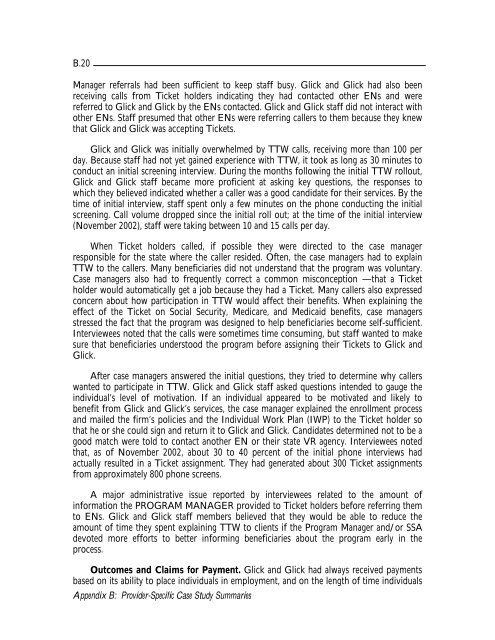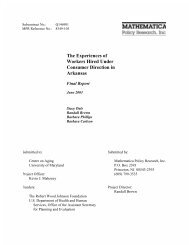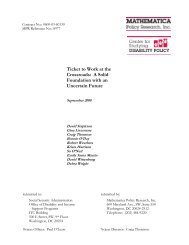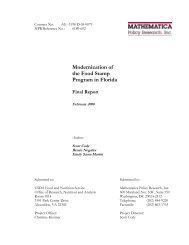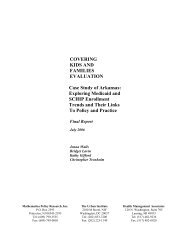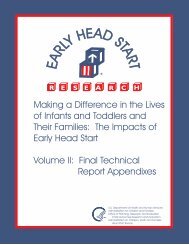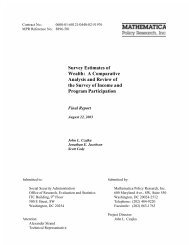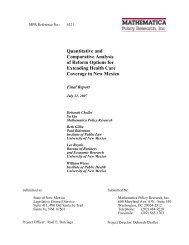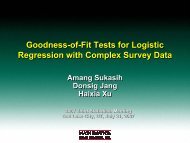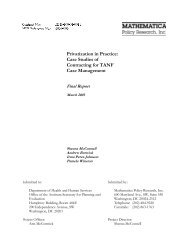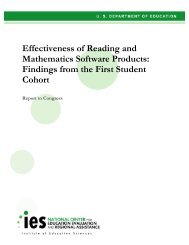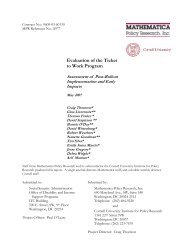Evaluation of the Ticket to Work Program Initial Evaluation Report
Evaluation of the Ticket to Work Program Initial Evaluation Report
Evaluation of the Ticket to Work Program Initial Evaluation Report
Create successful ePaper yourself
Turn your PDF publications into a flip-book with our unique Google optimized e-Paper software.
B.20<br />
Manager referrals had been sufficient <strong>to</strong> keep staff busy. Glick and Glick had also been<br />
receiving calls from <strong>Ticket</strong> holders indicating <strong>the</strong>y had contacted o<strong>the</strong>r ENs and were<br />
referred <strong>to</strong> Glick and Glick by <strong>the</strong> ENs contacted. Glick and Glick staff did not interact with<br />
o<strong>the</strong>r ENs. Staff presumed that o<strong>the</strong>r ENs were referring callers <strong>to</strong> <strong>the</strong>m because <strong>the</strong>y knew<br />
that Glick and Glick was accepting <strong>Ticket</strong>s.<br />
Glick and Glick was initially overwhelmed by TTW calls, receiving more than 100 per<br />
day. Because staff had not yet gained experience with TTW, it <strong>to</strong>ok as long as 30 minutes <strong>to</strong><br />
conduct an initial screening interview. During <strong>the</strong> months following <strong>the</strong> initial TTW rollout,<br />
Glick and Glick staff became more pr<strong>of</strong>icient at asking key questions, <strong>the</strong> responses <strong>to</strong><br />
which <strong>the</strong>y believed indicated whe<strong>the</strong>r a caller was a good candidate for <strong>the</strong>ir services. By <strong>the</strong><br />
time <strong>of</strong> initial interview, staff spent only a few minutes on <strong>the</strong> phone conducting <strong>the</strong> initial<br />
screening. Call volume dropped since <strong>the</strong> initial roll out; at <strong>the</strong> time <strong>of</strong> <strong>the</strong> initial interview<br />
(November 2002), staff were taking between 10 and 15 calls per day.<br />
When <strong>Ticket</strong> holders called, if possible <strong>the</strong>y were directed <strong>to</strong> <strong>the</strong> case manager<br />
responsible for <strong>the</strong> state where <strong>the</strong> caller resided. Often, <strong>the</strong> case managers had <strong>to</strong> explain<br />
TTW <strong>to</strong> <strong>the</strong> callers. Many beneficiaries did not understand that <strong>the</strong> program was voluntary.<br />
Case managers also had <strong>to</strong> frequently correct a common misconception —that a <strong>Ticket</strong><br />
holder would au<strong>to</strong>matically get a job because <strong>the</strong>y had a <strong>Ticket</strong>. Many callers also expressed<br />
concern about how participation in TTW would affect <strong>the</strong>ir benefits. When explaining <strong>the</strong><br />
effect <strong>of</strong> <strong>the</strong> <strong>Ticket</strong> on Social Security, Medicare, and Medicaid benefits, case managers<br />
stressed <strong>the</strong> fact that <strong>the</strong> program was designed <strong>to</strong> help beneficiaries become self-sufficient.<br />
Interviewees noted that <strong>the</strong> calls were sometimes time consuming, but staff wanted <strong>to</strong> make<br />
sure that beneficiaries unders<strong>to</strong>od <strong>the</strong> program before assigning <strong>the</strong>ir <strong>Ticket</strong>s <strong>to</strong> Glick and<br />
Glick.<br />
After case managers answered <strong>the</strong> initial questions, <strong>the</strong>y tried <strong>to</strong> determine why callers<br />
wanted <strong>to</strong> participate in TTW. Glick and Glick staff asked questions intended <strong>to</strong> gauge <strong>the</strong><br />
individual’s level <strong>of</strong> motivation. If an individual appeared <strong>to</strong> be motivated and likely <strong>to</strong><br />
benefit from Glick and Glick’s services, <strong>the</strong> case manager explained <strong>the</strong> enrollment process<br />
and mailed <strong>the</strong> firm’s policies and <strong>the</strong> Individual <strong>Work</strong> Plan (IWP) <strong>to</strong> <strong>the</strong> <strong>Ticket</strong> holder so<br />
that he or she could sign and return it <strong>to</strong> Glick and Glick. Candidates determined not <strong>to</strong> be a<br />
good match were <strong>to</strong>ld <strong>to</strong> contact ano<strong>the</strong>r EN or <strong>the</strong>ir state VR agency. Interviewees noted<br />
that, as <strong>of</strong> November 2002, about 30 <strong>to</strong> 40 percent <strong>of</strong> <strong>the</strong> initial phone interviews had<br />
actually resulted in a <strong>Ticket</strong> assignment. They had generated about 300 <strong>Ticket</strong> assignments<br />
from approximately 800 phone screens.<br />
A major administrative issue reported by interviewees related <strong>to</strong> <strong>the</strong> amount <strong>of</strong><br />
information <strong>the</strong> PROGRAM MANAGER provided <strong>to</strong> <strong>Ticket</strong> holders before referring <strong>the</strong>m<br />
<strong>to</strong> ENs. Glick and Glick staff members believed that <strong>the</strong>y would be able <strong>to</strong> reduce <strong>the</strong><br />
amount <strong>of</strong> time <strong>the</strong>y spent explaining TTW <strong>to</strong> clients if <strong>the</strong> <strong>Program</strong> Manager and/or SSA<br />
devoted more efforts <strong>to</strong> better informing beneficiaries about <strong>the</strong> program early in <strong>the</strong><br />
process.<br />
Outcomes and Claims for Payment. Glick and Glick had always received payments<br />
based on its ability <strong>to</strong> place individuals in employment, and on <strong>the</strong> length <strong>of</strong> time individuals<br />
Appendix B: Provider-Specific Case Study Summaries


